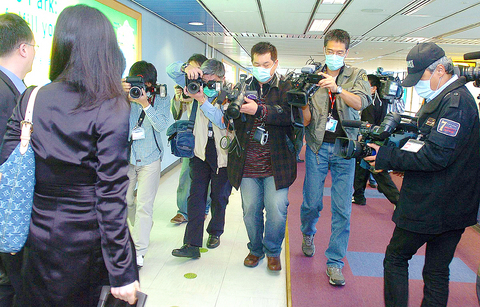The nation's reporters, known for occasional aggressive behavior toward visiting officials and celebrities at CKS International Airport, will no longer have access to the airport's restricted areas, Minister of the Interior Lee Yi-yang (李逸洋) said yesterday.
Visiting celebrities -- most famously Elton John in 2004 -- have been shocked by the antics of highly competitive reporters, photographers and cameramen at the airport.
Visits by senior officials traveling through CKS airport are also sometimes shrouded in secrecy.

PHOTO: YAO KAI-SHIOU, TAIPEI TIMES
"Itineraries of important foreign political figures and local officials are often confidential and they do not want their schedules to be exposed at the airport," Lee said.
"Clashes between reporters and visiting entertainers in the past also hurt the country's image," he said.
The ministry will stop issuing restricted area passes for reporters from March 1, Lee said, adding that the government's decision to cancel permits allowing journalists to be stationed at the airport was not aimed at "clamping down on press freedom," but in line with international practice.
Starting next month, media outlets will have to apply for approval in advance for reporters and photographers to cover a story at CKS airport, and authorities will handle applications on a case-by-case basis, he said.
A dozen reporters who are stationed at the airport wore masks yesterday to protest the ban.
"The government's decision takes away our right to cover news," said Tony Yao (
Elton John swore at reporters who swarmed around him at the airport, calling them "rude, vile pigs," while fellow British singer Robbie Williams was chased through the terminal when he arrived for a concert in 2001. In 2003, Corsican singer Alizee had to hide in a bathroom to evade the press. She canceled her schedule the next day and returned to France.

NATIONAL SECURITY THREAT: An official said that Guan Guan’s comments had gone beyond the threshold of free speech, as she advocated for the destruction of the ROC China-born media influencer Guan Guan’s (關關) residency permit has been revoked for repeatedly posting pro-China content that threatens national security, the National Immigration Agency said yesterday. Guan Guan has said many controversial things in her videos posted to Douyin (抖音), including “the red flag will soon be painted all over Taiwan” and “Taiwan is an inseparable part of China,” while expressing hope for expedited “reunification.” The agency received multiple reports alleging that Guan Guan had advocated for armed reunification last year. After investigating, the agency last month issued a notice requiring her to appear and account for her actions. Guan Guan appeared as required,

A strong cold air mass is expected to arrive tonight, bringing a change in weather and a drop in temperature, the Central Weather Administration (CWA) said. The coldest time would be early on Thursday morning, with temperatures in some areas dipping as low as 8°C, it said. Daytime highs yesterday were 22°C to 24°C in northern and eastern Taiwan, and about 25°C to 28°C in the central and southern regions, it said. However, nighttime lows would dip to about 15°C to 16°C in central and northern Taiwan as well as the northeast, and 17°C to 19°C elsewhere, it said. Tropical Storm Nokaen, currently

‘NATO-PLUS’: ‘Our strategic partners in the Indo-Pacific are facing increasing aggression by the Chinese Communist Party,’ US Representative Rob Wittman said The US House of Representatives on Monday released its version of the Consolidated Appropriations Act, which includes US$1.15 billion to support security cooperation with Taiwan. The omnibus act, covering US$1.2 trillion of spending, allocates US$1 billion for the Taiwan Security Cooperation Initiative, as well as US$150 million for the replacement of defense articles and reimbursement of defense services provided to Taiwan. The fund allocations were based on the US National Defense Authorization Act for fiscal 2026 that was passed by the US Congress last month and authorized up to US$1 billion to the US Defense Security Cooperation Agency in support of the

PAPERS, PLEASE: The gang exploited the high value of the passports, selling them at inflated prices to Chinese buyers, who would treat them as ‘invisibility cloaks’ The Yilan District Court has handed four members of a syndicate prison terms ranging from one year and two months to two years and two months for their involvement in a scheme to purchase Taiwanese passports and resell them abroad at a massive markup. A Chinese human smuggling syndicate purchased Taiwanese passports through local criminal networks, exploiting the passports’ visa-free travel privileges to turn a profit of more than 20 times the original price, the court said. Such criminal organizations enable people to impersonate Taiwanese when entering and exiting Taiwan and other countries, undermining social order and the credibility of the nation’s